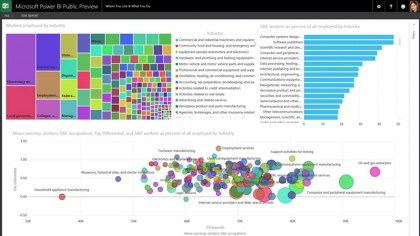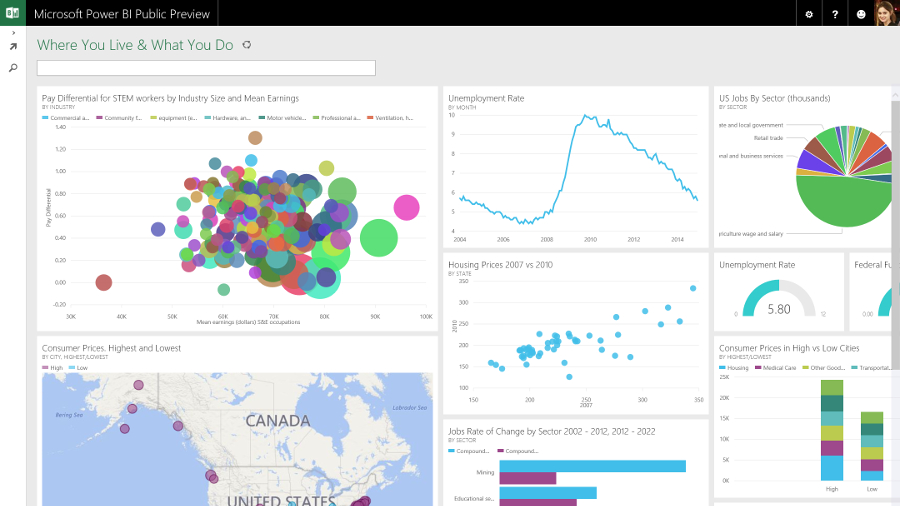Is cloud-powered business intelligence genuinely useful or mere hype?
Data is being 'democratised', but is it too soon for BI in the cloud?
Microsoft Power BI: The hybrid solution
Hosted on the growing Microsoft Azure public cloud, Power BI is a data visualisation solution very different to Amazon QuickSight. This is self-service BI available on data anywhere in the Microsoft data platform, including on-premise databases that are connected.

That's key because even if cloud BI is considered cheaper, you can't put data on the cloud overnight; it's both expensive and time consuming. So even if everyone agrees that BI should take place wherever the data is, large datasets are likely to remain in flux for some years to come. Cue hybrid approaches that let organisations get one foot in the cloud.
"A number of vendors offer cloud-only solutions, but many businesses still favour a hybrid model as they make the transition to becoming fully cloud-based," says Whitehead, whose Oracle Business Analytics product supports both cloud and on-premise deployments.
So is Microsoft's hybrid the wisest choice? "Microsoft Cortana Analytics on Azure allows for a number of hybrid cloud scenarios where a data store on-premise may be queried directly by Power BI," says Van Gulck, though he stresses that any data management layer must be correctly architected by specialists.
Lifted and shifted
A lot of so-called cloud BI really isn't what it claims to be. "The fallacy of cloud BI is what you see in legacy or other 'fake' cloud solutions, which are really just on-premises solutions lifted and shifted to the cloud," says Jones. "All that does is shift costs of operations from customer to vendor – it does not provide any additional value to the customer."
The promise that cloud BI can analyse information from massive pools of data, across disparate and multiple systems, and make it easily accessible in the day-to-day running of businesses is "far from the reality" according to Tom Cahill, VP of EMEA at Logi Analytics.
"Cloud BI is struggling to gain adoption for standard business operations," he says. "Companies certainly use private clouds to run BI apps, but when it comes to BI as a service in the cloud, typical use-cases to date have been either experiments, mostly limited to silo-ed departmental deployments, or time-bound projects." Is the cloud the right place for analytics users' day-to-day needs? The jury is out.
Are you a pro? Subscribe to our newsletter
Sign up to the TechRadar Pro newsletter to get all the top news, opinion, features and guidance your business needs to succeed!

Are companies hesitant to embrace cloud BI?
Data security and data sovereignty are hugely live issues. Banks and government agencies' approach to the cloud has been famously tentative when it comes to entrusting sensitive corporate or financial information to the medium.
"Having solid security mechanisms in place, such as data partitioning and multi-tenant capabilities, will help instil confidence and quell concerns when adopting cloud-based BI deployments," thinks Baxter, "particularly as the cloud continues to be a tried and tested technology in other areas."
Some think that companies are right to be hesitant to embrace the cloud for their BI. "Moving and processing very high volumes of data using a cloud service is still unachievable, certainly for now," says Cahill. For him, cloud BI is more of a concept than a reality – and not a very convincing one unless the movement of data and restructuring of IT systems can be figured out.
Without that, he says that it won't be a viable solution for 99% of self-service analytics users, adding: "Cloud BI will remain as hype."
Jamie is a freelance tech, travel and space journalist based in the UK. He’s been writing regularly for Techradar since it was launched in 2008 and also writes regularly for Forbes, The Telegraph, the South China Morning Post, Sky & Telescope and the Sky At Night magazine as well as other Future titles T3, Digital Camera World, All About Space and Space.com. He also edits two of his own websites, TravGear.com and WhenIsTheNextEclipse.com that reflect his obsession with travel gear and solar eclipse travel. He is the author of A Stargazing Program For Beginners (Springer, 2015),
